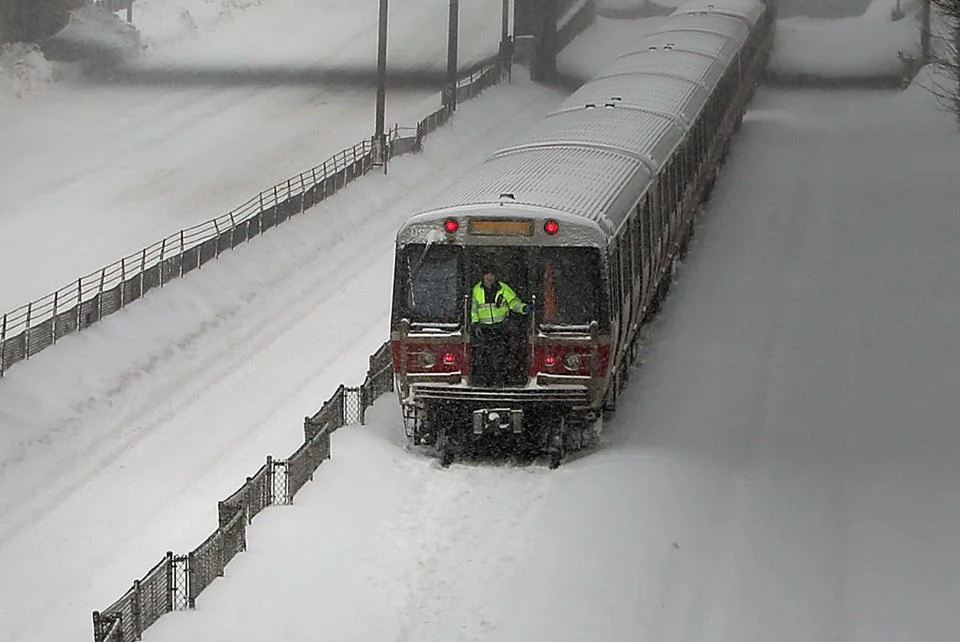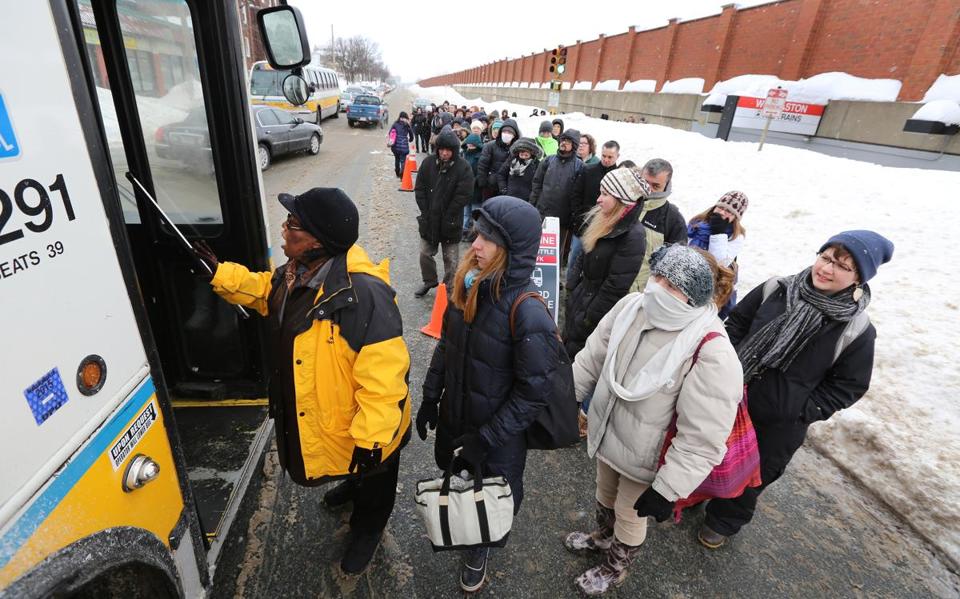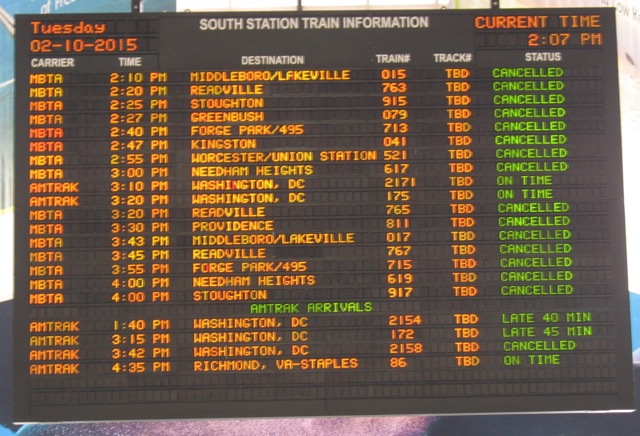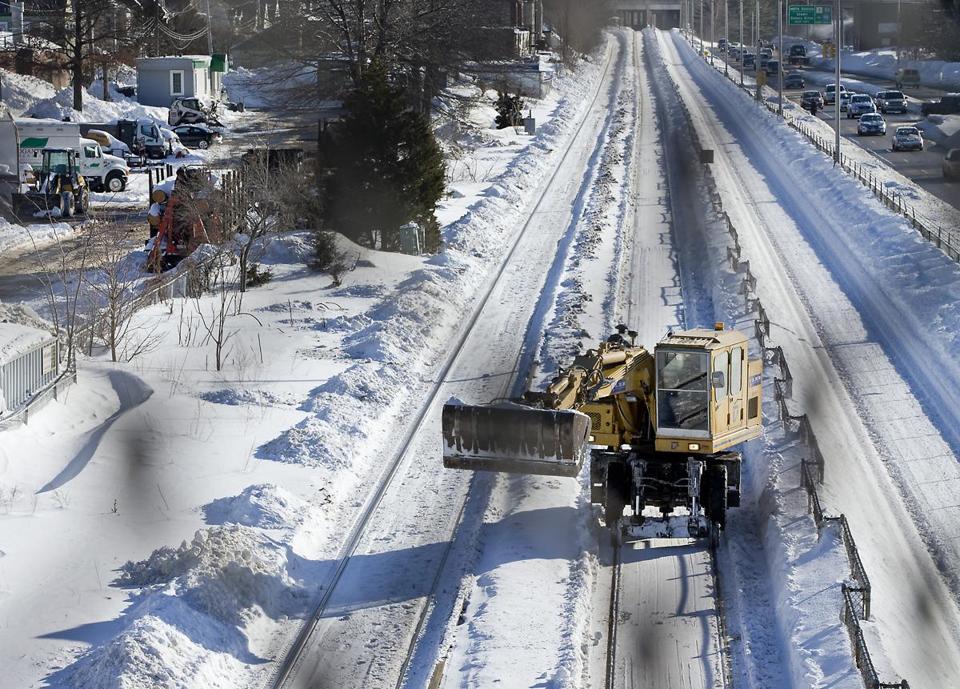
Podcast 10 - Fixing the T: immediate and medium-term solutions
The collapse of Boston's long-neglected transit system has dominated the news this week along with calls for more MBTA funding, but no action has been taken and the General Manager unexpectedly quit after receiving a unanimous vote of confidence. The city remains gridlocked and our only "solution" has been to truck snow out to the suburbs. Governor Baker called for another study to reach the same conclusions as all the previous studies. No amount of "reform" or new management is going to make up for inadequate revenue, and if the state continues to neglect the lifeblood of our economy, perhaps cities will be forced to unite in taxing themselves. There may also be some real estate revenue opportunities. We debunk myths about system expansion, transportation inequity and other uninformed opinions people are spouting in the media and on Beacon Hill.
For now, an emergency transit plan is needed. We're talking immediate and radical changes, working with the state and other cities to have a transportation plan so that the city can keep moving when the T fails (which we know will continue to happen). The trials of the past month should make clear how the T impacts everyone in the region, not just riders, and can be a perfect opportunity to demonstrate transit priority measures that we should have all the time. Currently suburbanites can drive into downtown faster than many Boston residents can get downtown; we think that needs to change.
The collapse of Boston's long-neglected transit system has dominated the news this week along with calls for more MBTA funding, but no action has been taken and the General Manager unexpectedly quit after receiving a unanimous vote of confidence. The city remains gridlocked and our only "solution" has been to truck snow out to the suburbs. Governor Baker called for another study to reach the same conclusions as all the previous studies. No amount of "reform" or new management is going to make up for inadequate revenue, and if the state continues to neglect the lifeblood of our economy, perhaps cities will be forced to unite in taxing themselves. There may also be some real estate revenue opportunities. We debunk myths about system expansion, transportation inequity and other uninformed opinions people are spouting in the media and on Beacon Hill.
For now, an emergency transit plan is needed. We're talking immediate and radical changes, working with the state and other cities to have a transportation plan so that the city can keep moving when the T fails (which we know will continue to happen). The trials of the past month should make clear how the T impacts everyone in the region, not just riders, and can be a perfect opportunity to demonstrate transit priority measures that we should have all the time. Currently suburbanites can drive into downtown faster than many Boston residents can get downtown; we think that needs to change.
Did we miss something or get it wrong? Send us your questions, comments and ideas for topics or guests >> contact us. Or share your thoughts in the comments below.
The Transit Matters Podcast is your source for transportation news, analysis, interviews and more. We focus on sustainable transportation planning, operations and policies in Boston and beyond. Transit Matters is a joint project of local transit advocates Marc Ebuña, Jeremy Mendelson and Josh Fairchild.
Like this project? Share it around, tell your friends and colleagues, and subscribe to the RSS feed to be notified of new posts and episodes. And sign the T4Massachusetts petition to lawmakers for proper T funding.
An Emergency Transportation Plan to Fix Boston's Transit Crisis
Yesterday we learned that due to decades of neglect the MBTA will need at least 30 days to restore service to the normal level of delays, signal problems and disabled trains we're used to. While there is plenty of blame to go around, right now we must focus on the current emergency.
Yesterday we learned that due to decades of neglect the MBTA will need at least 30 days to restore service to the normal level of delays, signal problems and disabled trains we're used to. While there is plenty of blame to go around, right now we must focus on the current emergency.




We must act quickly to implement a temporary transit network that would people to resume their lives before the state's economy collapses and half the city's population is out of work. Mayor Walsh and MBTA General Manager Beverly Scott should seek help from cities and transit agencies who have experience with natural disasters. With bold political leadership and around 1,000 buses from across the northeast we can put an emergency transportation plan into action.
For guidance we should look to MTA New York City Transit, which in 2012 implemented emergency "bus bridges" connecting Brooklyn and Manhattan two days after Hurricane Sandy knocked out all subway service in the city's core (photos). The city used simple cones to create dedicated bus lanes along the shuttle route and police officers to enforce the lanes and keep over 200 buses moving on each route. MTA also ran a long-term shuttle route to replace the A line in Queens and a year earlier replaced suspended commuter rail service after Hurricane Irene.
Here and now, a network of emergency shuttle bus routes must be created based roughly on known travel patterns. Bus routes would not exactly mimic subway corridors but they would get you into the city's core where you can walk or use what's left of the T. Some routes would use dedicated bus lanes and receive priority over all other traffic, with police enforcement, while other corridors would be open only to buses. For all of the issues with bus service, the MBTA does a great job running shuttle bus links such as Harvard-Alewife and Lechmere-North Station when things are planned in advance.
Cars carrying fewer than 3 occupants would be prohibited from entering the city or using major highways inside Route 128. Slug lanes would allow those who must drive from suburban areas to pickup additional passengers before continuing on. Large parking lots along I-495 and Route 128 can be turned into park-and-ride lots with bus shuttles operating in dedicated bus lanes on all major highways.
Bikes must be part of the solution. It is certainly cold outside but desperate times call for desperate measures. Better to ride 3 miles in the cold than wait for a bus in the cold for the same 15 minutes, and every 50 bikes represents one more bus available elsewhere. Designating corridors like Washington St, Massachusetts Ave, Huntington St and Commonwealth Ave for buses and bicycles only would enable reasonably fast limited-stop bus service while giving people people a safe place to ride. Secure bicycle parking tents can be setup in several downtown locations and an emergency ordinance could require most office buildings to allow bikes inside until full subway service resumes.
Walking should be encouraged whenever possible in order to minimize stress on the transit system. Bostonians have not experienced a transit strike in recent decades but experience from other cities shows people will gladly walk a few miles if they can. Currently our sidewalks are a treacherous mix of snow and ice, so vehicle lanes can be converted to pedestrian lanes until sidewalks are clear, with some key roads open to buses and pedestrians only.
Some of these measures may sound extreme, but desperate times call for desperate measures, and I believe even the harshest critics of transit would be surprised by how well the city would function if they would just allow a demonstration.
At the very least, this plan would prevent the total collapse of the region and it is our chance to show definitively that a fast, frequent and comprehensive transit network is invaluable to the entire region. Eventually we'll wonder how we ever lived without one.
Scott’s Resignation a Wake Up Call for Massachusetts
MBTA GM Beverly Scott, PhD, delivered an impassioned speech earlier this week [Photo via Boston Globe]
We’ve seen it before: the highly qualified leader of a beleaguered transit agency gets fed up with state politics getting in the way of him/her doing his/her job and resigns.
Take Jay Walder, former CEO of Hong Kong MTR, former Managing Director for Finance and Planning of Transport for London, and current CEO of Motivate, the company that manages Hubway. When he resigned as NYC MTA CEO back in 2011, it was not merely to take the job at HK MTR that paid 3 times as much. His resignation followed significant difficulty with indifferent politicians and seemed to be punctuated by his last in-person encounter with Governor Cuomo: getting passed over after travelling to the governor's office. Unlike here where the seat of state government is less than a kilometre away from transit headquarters, Walder had travelled to the capitol 2.5 hours by train upstate to see the governor.
MBTA GM Beverly Scott, PhD, delivered an impassioned speech earlier this week [Photo via Boston Globe]
We’ve seen it before: the highly qualified leader of a beleaguered transit agency gets fed up with state politics getting in the way of him/her doing his/her job and resigns.
Take Jay Walder, former CEO of Hong Kong MTR, former Managing Director for Finance and Planning of Transport for London, and current CEO of Motivate, the company that manages Hubway. When he resigned as NYC MTA CEO back in 2011, it was not merely to take the job at HK MTR that paid 3 times as much. His resignation followed significant difficulty with indifferent politicians and seemed to be punctuated by his last in-person encounter with Governor Cuomo: getting passed over after travelling to the governor's office. Unlike here where the seat of state government is less than a kilometre away from transit headquarters, Walder had travelled to the capitol 2.5 hours by train upstate to see the governor.
Jay Walder as NYC MTA CEO [Photo via Wall Street Journal]
His gubernatorial jilting may not have been the direct cause of his resignation, but it followed a series of events that showed the governor didn't have his back. Like Scott, Walder was the previous governor's appointment. Just as here, there was little contact with the governor since the new governor's entry to office. And as in this case, clear praise from the governor only came after the transit leader stepped down.
In a recent lecture at the Harvard Kennedy School of Business, Walder plainly stated that US transit agencies simply cannot continue to depend on the state governments for revenue as they annually turn their back on the very lifeblood of their economies and, in turn, their tax revenues. Even at Hong Kong MTR, the world’s most profitable transit system in operation, major capital expenses for expansions are heavily subsidised by central government.
Baker may not have explicitly asked for Scott’s resignation, but it was clear from her press conference on Tuesday this week that she was mad as hell and she wasn’t going to take this anymore. At the moment, the motivation behind her resignation remains veiled, but it's clear that this doesn't come from a lack of confidence in her. The resignation letter she submitted shortly after a MassDOT board meeting in which she was lauded for her work reads like a melancholy goodbye to a good friend.
"I'm as mad as hell and I'm not going to take it anymore!"
Ultimately, where do we go from here? That's the hard part. Some have suggested hiring the new T boss from within. The benefit is that many of these people already know the nuances of the system.
Looking outside the T would prove more difficult, as we noted several years ago leading up to Dr. Scott's appointment. Public sector executives are paid considerably less than their private sector counterparts, which makes it more difficult to recruit knowledgeable and experienced talent. Add to that the weight of transit politics and near-guaranteed politicking with an unsupportive legislature and no sign of commitment to new or more revenue from the current administration.
The good folks over at Radio Boston also had a few words on what's to come. Former Governor Dukakis and David Gunn have reflected on what might be needed of Governor Baker in the coming weeks: get on the T.
Dr. Scott's point remains: 'Just take Bev out the picture...this is not just about cutting costs'; we need to actually start having the adult conversation because whoever comes next, they won't be able to do diddly-squat without a significant down payment on the capital investments we've needed thousands of yesterdays ago.
Categories
- Children (1)
- Diversions (1)
- Olympics (1)
- MAPC (2)
- Red–Blue Connector (2)
- Urban Design (3)
- Bus (4)
- Fares (4)
- Late Night Service (4)
- MBTA ROC (4)
- Silver Line (4)
- Snow (5)
- Blue Line (8)
- Emergency (8)
- Orange Line (8)
- Public Comment (8)
- Maintenance (9)
- Operations (9)
- Signage (9)
- Fare Collection (10)
- Labs (11)
- Safety (11)
- Planning (12)
- Communication (14)
- MBCR (14)
- MassDOT (14)
- Green Line (16)
- History & Culture (16)
- Red Line (18)
- MBTA Bus (21)
- Commuter Rail (24)
- Advocacy (26)
- Capital Construction (28)
- Politics (30)
- Podcast (35)
- News (38)
- Media (40)
- Funding (42)
- Statements (50)
- MBTA (57)




![Jay Walder as NYC MTA CEO [Photo via Wall Street Journal]](https://images.squarespace-cdn.com/content/v1/533b9a24e4b01d79d0ae4376/1423875431024-JK9ZLOEVDKSSWUE3BNGG/OB-OV128_walder_G_20110721153344%5B1%5D.jpg)
